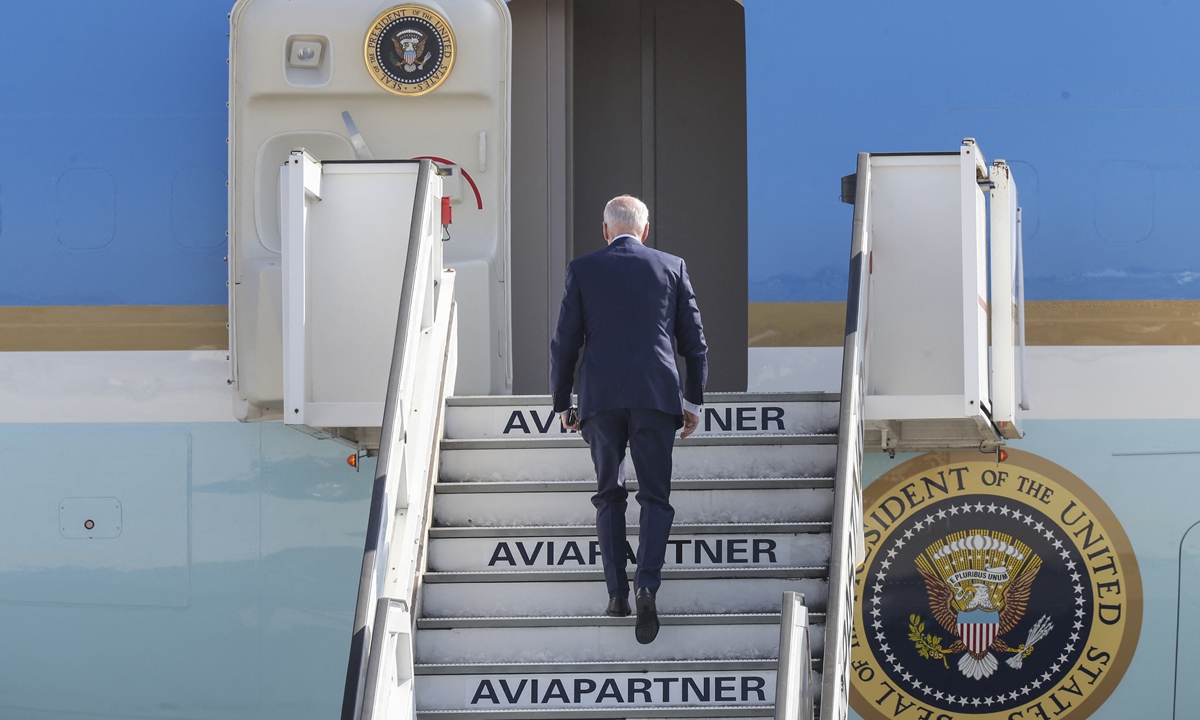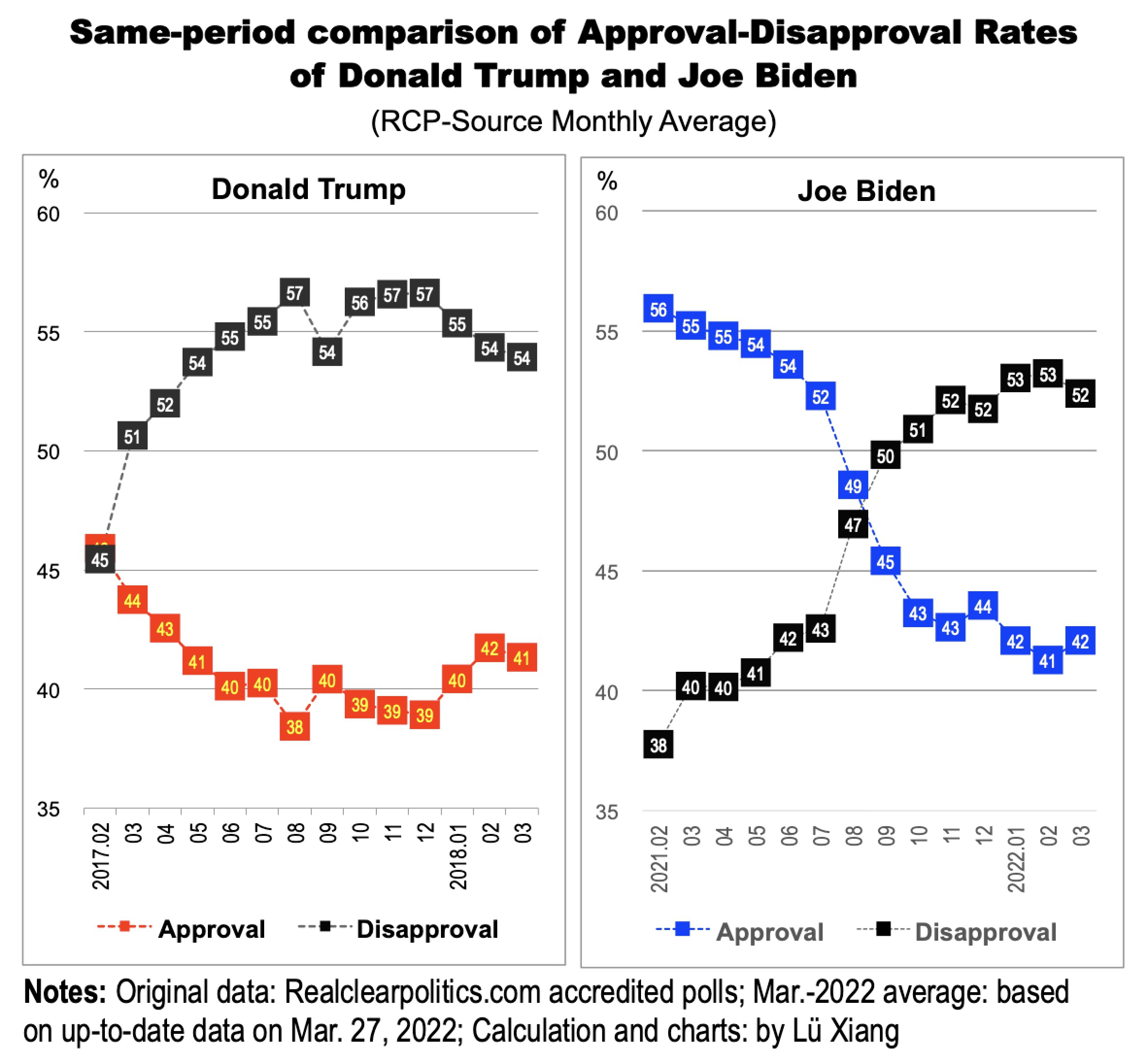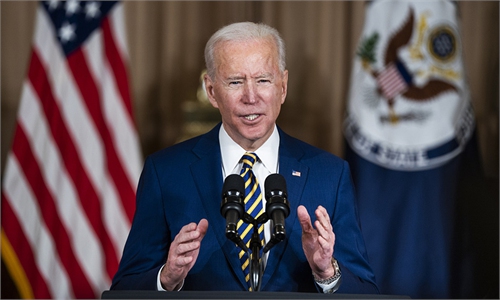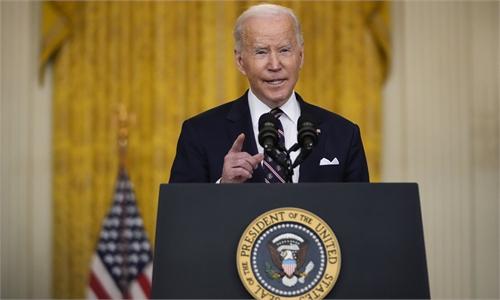Biden mired in credibility crisis on Ukraine amid attempt to seek defense spending boost
Fanning war to divert internal conflicts won't work or make US great

US President Joe Biden departures from Brussels to Poland on March 25, 2022 after attending a NATO summit. Photo: AFP
The White House on Monday asked Congress for an $813 billion national defense in 2023, including $773 billion for the Pentagon, a four percent rise from the 2022 submission, with the "pacing challenge" of China and the "Russian aggression" to justify the request.
A day after US President Joe Biden forcefully declared in Poland that Russian President Vladimir Putin "cannot remain in power", a national poll released by NBC News on Sunday ironically showed that Biden's job approval fell to its lowest in his presidency, amid inflation, COVID-19 outbreaks, and concerns of rising military expenditure and the escalating Ukraine crisis.
On the sharp contrast between the record-breaking defense budget request and lowest approval rating, Chinese experts said the White House should be aware that creating rivals and showing military toughness is not the way to win public support and make the US look great again.
The days of creating tension or even war to solve deep problems at home are gone, and the US' position on the Ukraine crisis is not as justified as it thinks it is, they said.
The budget, according to US media, also includes $6.9 billion for the European Deterrence Initiative and $1.8 billion to expand the US military presence in the Indo-Pacific region. And there is an additional $682 million for Ukraine to fight Russia. "Persistent threats" posed by Iran and North Korea were also mentioned in the budget request.
US Secretary of Defense Lloyd Austin said in a statement on Monday that the budget "reflects our National Defense Strategy and the focus of that strategy on the pacing challenge of China."
But the fact is that China's defense budget in 2022 is about $230 billion, meaning that the US military budget will remain nearly four times China's and leads the world.
The Pentagon also transmitted the classified 2022 National Defense Strategy to Congress on Monday, which stated that the Pentagon will act urgently to sustain and strengthen deterrence, with China as the most consequential strategic competitor.
Chinese Foreign Ministry spokesperson Wang Wenbin slammed Washington on Tuesday that their report is full of Cold War and bloc confrontation mentality.
"China and Russia are two major countries. The US attempt to contain and suppress them will not succeed. The US should reflect on its responsibilities in the Ukraine crisis, review and correct the practice of creating imaginary enemies, ignoring other countries' political and security concerns and mobilizing bloc confrontation," Wang said.
The US' military spending hike risks an arms race and threatens global stability and peace, and this is dangerous to not only China, but also other countries, analysts said.
The US has been fanning the flames and stirring trouble all over the world so it can benefit from the conflicts, analysts said, noting that the US not only gains geopolitical advantages through the conflicts it triggered, but also economic gains through the sale of arms, among others.
Lessons to be learned
It is very likely that the latest poll would not impact Biden's aggressive 2023 budget. A day before the defense budget request, a poll conducted by NBC News showed that 7 in 10 Americans expressed "low confidence" in Biden's ability to deal with the Ukraine crisis.
It also found that the 79-year-old president's job approval ratings had declined to 40 percent, the lowest of his presidency, during the country's largest inflation spike in 40 years. Seventy-one percent of Americans said they believe the nation is headed on the wrong track, according to the NBC poll.
Some experts said some Americans are panicked by the "threat of a war" their government is fomenting, but Biden could also lose points if he is not strong enough on the Ukraine crisis to underscore US "international leadership."
Liu Weidong, a research fellow at the Institute of American Studies at the Chinese Academy of Social Sciences, told the Global Times on Tuesday that isolationism has played a critical role in US political culture, and for a long time, Americans have been reluctant to get directly involved in foreign conflicts that do not concern them.
In the wake of the Ukraine crisis, isolationists felt more threatened because they believe that the US would be drawn into another foreign war, especially as American troops were just withdrawn from Afghanistan, Liu said.
According to NBC's poll, 82 percent said they're concerned that the Ukraine crisis will involve nuclear weapons, and 74 percent said they're concerned the US will send combat troops to Ukraine.
By increasing military spending, the US continues to foment conflict and antagonism, which will cause more anxiety and panic, Liu said.
A combined 57 percent of respondents said they believe the US is already at war with Russia or that it will be within the next year, according to the NBC.
Unlike the embarrassing war in Afghanistan which the US found itself mired in for over two decades, Biden now faces Russia, a nuclear power, Lü Xiang, a research fellow at the Chinese Academy of Social Sciences, told the Global Times on Tuesday.
Lü, who has closely traced the approval ratings of US presidents, said in the first three months of Biden and Donald Trump's second year in office, the average disapproval rates were almost identical, which range from 52 to 55 percent.

"Logically, when a country is in a state of risk, the public tends to support the incumbent leader. But in the US, it shows that the public has no confidence in either Trump or Biden," Lü said.
According to Lü, Biden's approval rating has slipped further after almost every big international diplomatic event.
"Pathetically, instead of using his resources and power to make things right in foreign policy, Biden has retained almost all of Trump's diplomatic junk as leverage for dealing with other countries," Lü said, noting that tensions between the US and many other countries, including Russia, are deepening rather than being relieved.
During his trip to Europe to reinforce ally unity, Biden said surprisingly on Saturday that Russian President Vladimir Putin should no longer remain in power. He also condemned Putin as a "butcher." Biden on Monday said he was expressing his outrage but will not make apologies.
Given that a federal tax investigation on President Biden's son Hunter's gains and relations with a Ukrainian natural gas company Burisma Holdings, which reportedly also has close ties with Ukraine President Volodymr Zelensky, analysts view the US President as complicating matters in Ukraine.
Russia on Sunday claimed that Hunter helped finance a US military "bioweapons" research program in Ukraine, the Daily Mail reported, citing new emails it exclusively obtained. Emails from Hunter's abandoned laptop show he helped secure millions of dollars of funding for Metabiota, a US Department of Defense contractor specializing in research on pandemic-causing diseases that could be used as bioweapons.
Biden is personalizing the bilateral ties between the US and Russia, and Americans are aware of the additional risks that personal grievances pose to the country, Lü said. "Once the entire US is dragged into a conflict with Russia because of the Biden family, the cost of war would be unaffordable."
Citing Trump's criticism of the Iraq war during the 2016 election race, Lü said the old days of using war or conflict to divert internal conflicts are gone and this does not make leaders great. "The American people are tired of war because the lessons of the past 20 years have been too profound."





